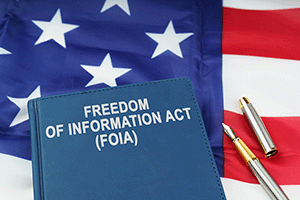Freedom of Information Act Requests

History of the Freedom of Information Act
What Information is Accessible under FOIA?
Using FOIA for Personal Background Checks
Looking Up Friends, Boyfriends, or Girlfriends Through Public Records
Using an FOIA Request To Search Yourself
Limitations of the FOIA
The Freedom of Information Act Uses, Benefits, and Limitations
In the United States, transparency is a foundational cornerstone in our democracy, which is largely defined by how the government shares information it collects on its citizens. An essential part of this transparency is the Freedom of Information Act (FOIA), which promotes open government, allowing people to access the information collected by the government. A Freedom of Information Act request for public records can be initiated by anyone, even if they are not United States citizens. There are a multitude of utilities that this law offers to the general public. This article delves deep into the roots, uses, requests, limitations, and privacy concerns of the FOIA, shedding light on its relevance in today’s digital age and how people use this to stay informed, and how to lookup public records.
History of the Freedom of Information Act
First passed in 1966, by President Lyndon B. Johnson, the FOIA was implemented with a specific purpose: to ensure that the public can access records that are collected by federal agencies. They foundation of this act was to create government transparency by ensuring that the activities, decisions, and functions of public government agencies are open and available to all. At the core of this information act, the FOIA has a focus on promoting public trust, by allowing people access the multitude of records the government collects. While the initial focus was on federal agencies, various provisions and amendments were added over the years which expanded this act to state and local agencies, creating transparency from the federal government to each of the states, counties and cities within the United States.
In 1974 there were some significant updates and amendments added to the FOIA, in the wake of the Watergate scandal that resulted in the impeachment of President Nixon. These 1974 amendments reduced the time a government agency had to respond to FOIA requests and narrowed the scope of what documents could be classified. This basically gave even more transparency as to what information the government was collecting on the people of the United States. These amendments also made more records available upon request. Since this was before the digital age of the internet, all FOIA requests were made in writing to the various government agencies.
Moving forward with the evolution of the FOIA, another amendment was added in 1996 which modified the FOIA to the Electronic Freedom of Information Act, which mandated that government agencies must make certain types of public records electronically available. This was the beginning of online public record databases which created a much easier path to accessing FOIA publicly available information. This made it possible for federal, state, and local governments to better coordinate on what information was available, as well as ensuring that general public has easy access to government collected information on its citizens. This amendment was a significant step in creating more transparency, as well as significantly reducing the amount of time it took to access public records.
Since the 1996 amendment there have been additional improvements and modifications made. In 2007 the OPEN Government Act was passed which significantly modernized the FOIA with the establishment of the Office of Government Information Services (OGIS). This new office is tasked with overseeing FOIA requests and helping federal, state and local agencies deal with the large backlog of FOIA request. This essentially allowed for better management of publicly available information and held government agencies accountable for any delays, or ignored FOIA requests.
Then in 2016, the FOIA Improvement Act was passed, which codified the requirement for government agencies to make frequently requested records available online to anyone that requests them. It also put a time requirement on fulfilling FOIA requests which created a much more streamlined system of requesting information from the various government agencies. This is the most recent update to the FOIA which has brought about changes that has modernized these information requests and allows for many agencies to allow access to public records autonomously, which means you don’t have to wait for a person to manually fulfill these requests. This is the latest step towards improving the efficiency and speed at which Freedom of Information Act requests are fulfilled. There is some talk of integrating artificial intelligence (AI) into the FOIA request system for many top level government agencies, but this is still in the discussion phase as of September 2023.

What Information is Accessible under FOIA?
The FOIA covers a vast range of records. From government budgets and meeting minutes to accessing a myriad of public records such as; vital records, criminal records, court records, driving records, financial records, immigration records, and naturalization records, to name a few. The accessibility of this information to the general public has many benefits to modern society. It allows people to know more about other people in their lives, such as finding out if a friend or a neighbor has a criminal record, or perhaps if there is a sex-offender in the neighborhood. It also adds an additional layer of security to people’s lives, knowing who they interact by being able to research what someone has hiding in their past. For example, if a person has a DUI or multiple speeding tickets on their driving record, you might not want to have that person to drive your kids or loved ones to school or work. That said, it is also important to understand that not all government records are open and accessible to the public. Certain personal and sensitive information is not available such as social security numbers, juvenile records, active military service records, and documents that might compromise national security. There is a limit to what is available to protect personal privacy and sensitive government information.
While some other countries have publicly available information, no other country compares to the amount of information that is available in the United States. The UK for example has public records available to their citizens however, the information available is withheld for 100 years before being made publicly available. That means that you cannot look up someone’s criminal record in the UK in real time.
Using FOIA for Personal Background Checks
In the diverse and interconnected society of the United States, personal background checks have become very common, not only by employers but also by individuals. Here’s where FOIA can be instrumental. For instance, if someone claims to have worked at a specific federal position or received a particular honor, a FOIA request can validate or debunk such claims. These information requests can be made by anyone. However, for employment verifications, academic applications, tenant screening and security clearances, these background record request must be made through an FCRA certified service provider. That said, for personal background checks, anyone can run a background report on someone using a public record website with just a first and last name. These online 3rd party resources, while completely legal, can only be used for unofficial verification purposes. This is where the majority of these personal background checks are run in the United States. Many people use public record websites to verify and research people in their lives, to ensure their safety and those of their loved ones. There are a multitude of reasons people use these public record resources for personal background checks, some are performed out of pure curiosity. No matter what the reason, this is all legal and publicly available information that anyone can access online.
It is important to note that while initiating a formal FOIA request, one must identify the appropriate agency, describe the records sought clearly, and pay any associated fees. Yet, while some personal data is accessible, the Act ensures that personal and private details, such as social security numbers, remain confidential.

Looking Up Friends, Boyfriends, or Girlfriends Through Public Records
It’s the age of the Internet, and the urge to know more about those around us is compelling. Finding out about a person’s past, and if they have a criminal record, is easy to do using a public record site. One of the benefits that many people appreciate about using an online service like this is you can perform your background searches anonymously, which means the person you are researching will not know about it. This can prove to be very valuable for people meeting a potential date or someone for the first time that they meet online. Running that person’s name through a public record database can let you know if they are being truthful about who they are and if they have anything in their past you should be concerned about. Access to public records offers many people a safety-net with who they allow into their inner circles.
Yet, while FOIA can provide wealth of publicly available information, there is a balance between finding out more about a person’s past and the ethical considerations that go along with this. Using public records for malicious intent or stalking is illegal and can lead to legal consequences. It is important to remember that how you use the information, you acquire through a public record site, is very important and can lead to significant repercussions if used improperly.
Using an FOIA Request To Search Yourself
While there are a lot of benefits to finding out information about other people, another use for public records is to find out what is in your background record and what other people can find. By running a quick search on yourself, you can see if everything looks accurate, and what is available for others to see. This can come in handy if you are applying for a new job, trying to rent a new home, or even traveling. For example, if you missed a court appearance and there is an active bench warrant in your name, this can complicate your ability to travel outside the state you live in. You may be arrested and detained when going through TSA security checkpoint at an airport. Another example is if you want to get a new job and you have a criminal record that hasn’t dropped off yet, you may be turned down for the position because of this.
A FOIA request for public records can also be handy to verify if your public record is accurate. Sometimes there are inaccuracies that can lead to complications in life. For example, if you have a traffic citation that should have dropped off your record and it hasn’t, an auto insurance company may decide to drop you or increase your premiums. If you discover that your public record has inaccuracies or find that something should have been cleared or expunged and hasn’t, you can get ahead of it before it costs you an opportunity. Finding out what is in your public record is always a good idea, especially if you’ve had a run-in with the law.
Limitations of the FOIA
Despite its benefits, the FOIA isn’t without limitations. As mentioned previously, several exemptions protect specific types of information. For example, documents that might compromise national security or reveal trade secrets are exempted, as well as juvenile records and active military service records. Additionally, personal data that might infringe on an individual’s privacy rights is off-limits, so there is a limit to what is available to the public. For example, you can look up someone’s marriage record but you cannot access their marriage certificate, that is an official document that would infringe on a person’s identity.
Furthermore, anyone who has filed a FOIA request knows that it isn’t always a smooth process. Delays can be extensive, and sometimes, data is redacted or only partially disclosed. There can be multiple reasons for these challenges, including a backlog of requests or the need for multiple agencies to review a single request. That being said, you can always access unofficial records through a public record website where you can access billions of records with some simple search tools. If you want to verify the background of someone of interest, this is completely within the guidelines of the FOIA as long as it is for unofficial purposes. If you need official documentation about a person’s public record then you will need to go through the proper official channels and get that person’s permission to do so. Official documentation can be used for official purposes such as job employment, tenant applications, academic applications and security clearances, to name a few.
Conclusion
The Freedom of Information Act has become a keystone to the democratic values of the United States, and the transparency and accountability of how government agencies operate. It is a powerful tool that, when used responsibly, can shed light on governmental operations and inform the public. This act has revolutionized how people can access public records, as well as the amendments that have been added over the last few decades. The balance between the public’s right to know and individual privacy is delicate. As citizens, it’s our responsibility to use the FOIA judiciously and ethically.
In a democracy, knowledge isn’t just power, it’s a responsibility. The FOIA hands the US citizens this responsibility, ensuring that everyone remains informed, and there are proper checks and balances put into place for the government. It protects the constitutional rights of every US citizen by being in the know, and having easy access to publicly available information.
Additional Resources
For those that want to do a deep dive into the FOIA or making a formal FOIA request, here are some additional resources that might come in handy:
- Agencies: A list of federal agencies and their contact details for FOIA requests can be found on the official FOIA website.
- Guidelines: Before making a request, familiarize yourself with the guidelines laid out by the Department of Justice, ensuring your application is both relevant and has a higher likelihood of success.
- Further Reading: For a comprehensive understanding, consider reading “The FOIA Ombudsman,” a National Archives blog detailing nuances and intricacies of the Act.
FOIA - Frequently Asked Questions
What is the Freedom of Information Act?
The Freedom of Information Act is a federal law that gives the general public access to government collected records, or public records, to promote transparency.Who can make a FOIA request?
Any person, regardless of being a US citizen, can make a FOIA request. This includes every person, all businesses, and media organizations.How do I make a Freedom of Information request?
To make a Freedom of Information request, first identify the relevant government agency and then send a written, or online, request detailing the information you're seeking. You can also access unofficial public records through most any public record website online.Why might a FOIA request be delayed?
It is not uncommon to have delays with FOIA requests. Some of the delays might result from needing to consult with multiple government agencies, the volume of records requested, or the need to make redactions to the record requests.Can I run an Freedom of Information Act request on myself?
Yes, requests for information on yourself are usually processed under the Privacy Act in conjunction with FOIA.Is there a limit to the number of FOIA requests I can submit?
No, there are no set limits however, having many requests by an individual or group can be labeled as "frequent requesters," which can lead to longer response times.Can I track the status of my FOIA request?
Yes, most government agencies have online portals where you can track the status of your request.What is a Glomar response?
A Glomar response is when a government agency will not confirm or deny the existence of the records that are requested.How much does an FOIA request cost?
They can be free depending on who is requesting them however, some agencies will charge fees for some record requests. It really depends on the nature of your FOIA request and what government agency you are making the request through.Can I make an online FOIA request?
Yes, many government agencies allow you to make electronic, or online requests. Some agencies however, still require you to put your request into writing. You will need to contact the relevant government agency to find out for certain.Before Comments
Please be advised that the information accessed through SearchQuarry.com searches may not always be accurate or current, as we neither generate nor authenticate the data provided via our service. The reliability and precision of information are primarily contingent upon diverse public sources from which data is compiled. By utilizing SearchQuarry.com, you acknowledge your acceptance of the terms delineated in the SearchQuarry.com terms of service and our privacy policies. Information acquired via SearchQuarry.com must not be utilized for unlawful purposes such as stalking or harassing individuals, or scrutinizing public figures or celebrities. Individuals who contravene these directives may be subject to both civil and criminal legal proceedings and sanctions. It is explicitly stated that SearchQuarry.com does not function as a "consumer reporting agency" as defined by the Fair Credit Reporting Act ("FCRA"), and therefore, does not furnish "consumer reports" pursuant to the FCRA. SearchQuarry.com strictly prohibits the utilization of information garnered from search results (a) for discriminatory practices against any consumer; (b) for assessing a consumer's eligibility for personal credit, insurance, employment, housing, or government licenses or benefits; or (c) in any other manner that may impact a consumer's economic or financial status or standing.


Comments
Last Updated: 2023-09-05